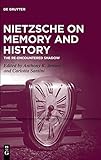Nietzsche on Memory and History : The Re-Encountered Shadow / ed. by Anthony K. Jensen, Carlotta Santini.
Material type: TextPublisher: Berlin ; Boston : De Gruyter, [2020]Copyright date: ©2021Description: 1 online resource (XIV, 340 p.)Content type:
TextPublisher: Berlin ; Boston : De Gruyter, [2020]Copyright date: ©2021Description: 1 online resource (XIV, 340 p.)Content type: - 9783110671070
- 9783110671230
- 9783110671162
- IN PROCESS
- online - DeGruyter
- Issued also in print.
| Item type | Current library | Call number | URL | Status | Notes | Barcode | |
|---|---|---|---|---|---|---|---|
 eBook
eBook
|
Biblioteca "Angelicum" Pont. Univ. S.Tommaso d'Aquino Nuvola online | online - DeGruyter (Browse shelf(Opens below)) | Online access | Not for loan (Accesso limitato) | Accesso per gli utenti autorizzati / Access for authorized users | (dgr)9783110671162 |
Frontmatter -- Acknowledgements -- Contents -- List of Abbreviations / Siglenverzeichnis -- Introduction -- Section I: History -- Critical History and Genealogy -- Typologies of Histories -- Origins and Genealogies -- Section II: Memory and Forgetting -- Nietzsche und das kulturelle Gedächtnis. Eine kritische Relektüre der Zweiten Unzeitgemässen Betrachtung -- „Göttlich ist des Vergessens Kunst“. Nietzsches Poetik des Gedächtnisses -- What is ‘Active’ Forgetting in Nietzsche’s Genealogy II, 1? -- Eternal Return and Memory -- Memory, History and the Paternal Shadow: Nietzsche’s Autobiographical Survival -- Das Trauma des Werdens – Nietzsche gegen die Identität -- Section III: The Person and Society -- Gedächtnis und Leiblichkeit: Herkunft, Gefahr und Aktualität ihres Zusammenhangs -- History and Memory in Civilization- Building Processes: A Reading of Der Antichrist, 56–58 -- Histories of Violence: Nietzsche on Cruelty and Normative Order -- Temporalities of the Feeling of Power -- „Versprechen können“ oder „versprechen dürfen“?: Anmerkungen über die ersten drei Abschnitte in der zweiten Abhandlung von Nietzsches Zur Genealogie der Moral -- Section IV: Context and Reception -- Die Literaturgeschichte als „künstlerische Produktion“. Der Schopenhauersche Begriff der Geschichte und die nachgelassenen Fragmente Nietzsches aus der Zeit 1867/1868 -- Zwischen Geschichte und Gedächtnis: Aby Warburg, Jacob Burckhardt und Friedrich Nietzsche -- Vordenker kollektiver identitätsbildender Gedächtniskonstruktionen? Eine kritische Sichtung der Nietzsche-Rezeption Aleida und Jan Assmanns -- Index
restricted access online access with authorization star
http://purl.org/coar/access_right/c_16ec
History and memory rank as central themes in the philosophy of Friedrich Nietzsche. As one of the last philosophers of the 19th century, Nietzsche naturally belongs to the so-called ‘historical century’. The contentious exchange with the past and with antiquity – as much as the mechanisms, the dangers, and the lessons of memory and tradition – are continually examined and stand in close relationship with Nietzsche’s vision of life and his project of human development. As Jacob Burckhardt once wrote of the cultural critique to his Basel colleague: "Fundamentally, you are always teaching history" (9/13/1882). Following Burckhardt’s judgment, the contributors focus on the analysis of core questions in the philosophies of history and memory, and their respective convergence in the thought of Nietzsche. The epistemological relevance of these central concepts will be thematized alongside those concerning tradition, and education. The discussion of these rich themes unifies a broad spectrum of questions, ranging from cultural memory to contemporary philosophy of mind. The contributions are revised versions of selected papers presented at the 2018 conference of the annual meeting of the Nietzsche Society in Naumburg.
Issued also in print.
Mode of access: Internet via World Wide Web.
In English.
Description based on online resource; title from PDF title page (publisher's Web site, viewed 01. Dez 2022)


